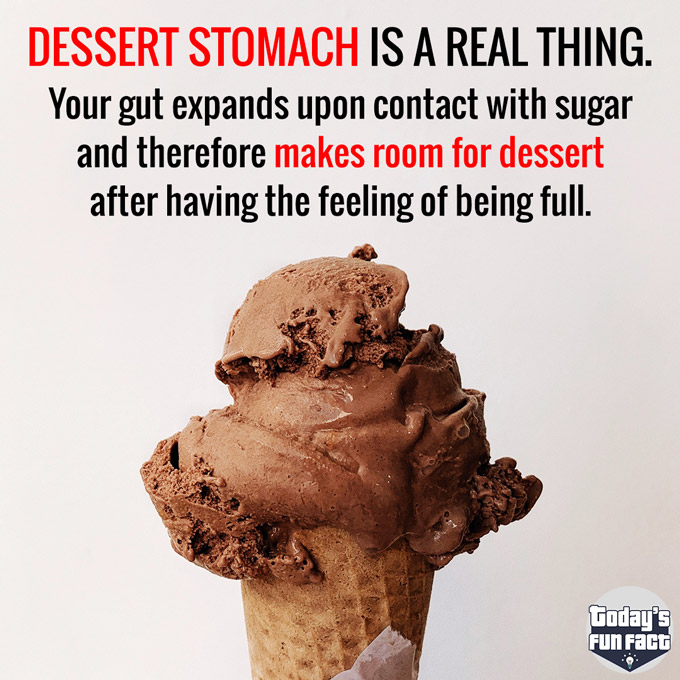
Dessert Stomach Is A Real Thing Graphic © todaysfunfact.com. Background photo: Unsplash (PD)
Ever wondered how you always seem to have room for dessert—regardless of how stuffed you are after the main course? According to scientists, there’s a perfectly good explanation for the satiation phenomenon we call ‘dessert stomach’.
Several studies suggest that our uncanny ability to muster some extra tummy space for dessert is linked to “sensory-specific satiety.” This is another way of saying we lose interest in a particular food as we continue to eat—and crave something different (i.e., luscious dessert).
Boredom at the Heart of ‘Dessert Stomach’?
Research by Dr Barbara Rolls from the Department of Nutritional Sciences at the Pennsylvania State University suggests that a combination of food texture, smell, appearance, and taste impact our feeling of fullness. This phenomenon is described as “ sensory-specific satiety.” It implies that the more we eat something, the less exciting or pleasurable we perceive it.
As Dr Rolls puts it, “The decline in pleasure you derive from food is specific to the food that you’ve been eating. Or to other foods that are similar. So, while you might lose your appetite for that food, a different food will be appealing. That’s why you always have room for dessert.”
In other words, that feeling of fullness you get after eating a bowlful of macaroni and cheese is simply your body losing interest in that type of meal.
An Evolutionary Tactic?
Now here’s where it gets interesting. Research suggests that switching foods rekindles our diminishing appetite.
You may be full to your ‘brim’ with a hearty macaroni and cheese dish, but you will still salivate when a chocolate sundae is presented. And your stomach will somehow create room for it.
The question is; why?
According to Dr Rolls, evolution may be at the heart of this satiety response. “We’re omnivores. And we need to eat a variety, it helps guarantee you will eat the variety of nutrients you need… Change in appeal during a meal keeps us going, keeps us eating.”
This implies that our brain is inherently wired to reward a varied (and hence ‘balanced’) diet—explaining why it’s so hard to keep our hands off that ice cream or the dessert that follows.
On the flip side, it may be argued that sensory-specific satiety contributes to the obesity pandemic we see today. Whether this is the case or not, moderation is key when it comes to our diet.
